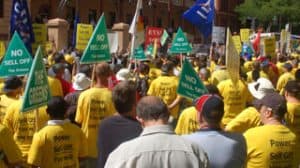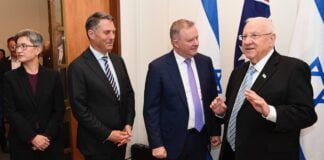THE TOPPLING of NSW Premier Morris Iemma and Treasurer Michael Costa, and the defeat of their plans to privatise the power stations, is a real victory against Labor’s agenda of privatisation and economic rationalism. It is also a blow against Kevin Rudd who made it clear that power privatisation fitted with federal Labor’s economic agenda.
The victory is the fruit of months of campaigning against privatisation led by the unions, involving rank and file Labor party members and activists from the Greens and other left organisations.
This shows that the unions can take on and defeat the party powerbrokers and also why it is right to defend union representation inside the ALP. Opposition to power privatisation united unions across both the right and left factions of the party in a fight for the rights of workers and the party rank and file.
This should be a turning point both to ramp up opposition to all aspects of the economic rationalist agenda of the state Labor government (including the mooted privatisation of ferries and water) and for rebuilding the left inside the party.
The opposition to privatisation expressed by the public, the unions and Labor members is massive.
The new premier, Nathan Rees, is the candidate who was finally anointed by the Labor party’s head office as they tried to manage the rank and file revolt against Iemma.
Yet, at his first press conference he made it clear that he plans to continue aspects of former Treasurer Michael Costa’s hardline economic rationalist program, stressing his commitment to maintaining the state’s AAA credit rating.
He declared his first challenge was to deal with the “challenging fiscal situation as outlined by Michael Costa…,” and asserted that “my commitment to the fiscal integrity of NSW… is rock-solid”.
On the ABC’s Stateline program he even said he would continue with the privatisation of the retail arm of the electricity industry which provoked the recent strike by USU members.
At a press conference to announce his own sacking, Michael Costa justified his demand for privatisation and cuts because of the government’s budget problems. He claimed the downturn in the economy was cutting revenues, health spending was $300 million over budget and that the government’s proposed infrastructure projects like the North-West Metro rail link could not be funded without asset sales and spending cuts. This is not true (see box).
Rees will present a mini-budget to the Parliament on Costa’s timetable. His public stance on the budget means we have to continue the campaign against privatisation and to break the public sector 2.5 per cent pay cap.
Rebuilding the left
The question now is whether unions and the left are capable of building on their victory against Iemma and Costa’s power sell-off and force a real change in the Labor government’s direction, rather than just a change of leader.
There is a huge opportunity for the left. The campaign against privatisation has shaken the factional system inside the Labor party. Opposition to the power sell-off cut across both right and left factions. Right wing unions took a stand on “old Labor” principles.
Rank and file Labor party members are angry about Labor MPs ignoring party policy. And there is some dismay among the ranks of the Labor left. At a Socialist Left meeting just before Iemma moved to push the privatisation vote in Parliament, there was talk of expelling from the faction any MPs who voted for privatisation.
Moves to discipline left MPs failed because key powerbrokers in the NSW Socialist Left, in particular the federal Labor MP Anthony Albanese, were able to pressure Labor MPs to vote in favour of privatisation. Even at the eleventh hour, a number of left MPs—including the new leaders, Nathan Rees and Carmel Tebbutt —refused to commit to voting against privatisation.
For too long the left has been reduced to jockeying for positions and influence inside the party, without any reference to working to win the party to alternative policies.
A legacy of Labor’s embrace of economic rationalism during the period of the Hawke-Keating government was that many in the left accepted the triumph of the market and went along with policies like privatisation and labour market deregulation.
For the left in the party to rebuild, it needs to adopt a firm policy of opposition to the disaster of economic rationalism in all its forms.
Often the anti-privatisation campaign seemed to disappear inside the Labor Party machine and was focussed solely on pressuring individual Labor MPs. The real strength was in the alliances between Labor members, union members, Greens and community activists and the willingness to mobilise against the government. Yet the power of union and community action still went largely untapped.
The Greens could have helped galvanise the left response by putting themselves at the centre of campaigning to build a movement of industrial action and mass rallies.
It is open for the left to build on this success. Any strike against privatisation or the wage cap should get solidarity across the union movement. We have had a real victory for the left in NSW. But this is only the beginning of the struggle against the Labor leadership’s addiction to economic rationalism.
By James Supple






